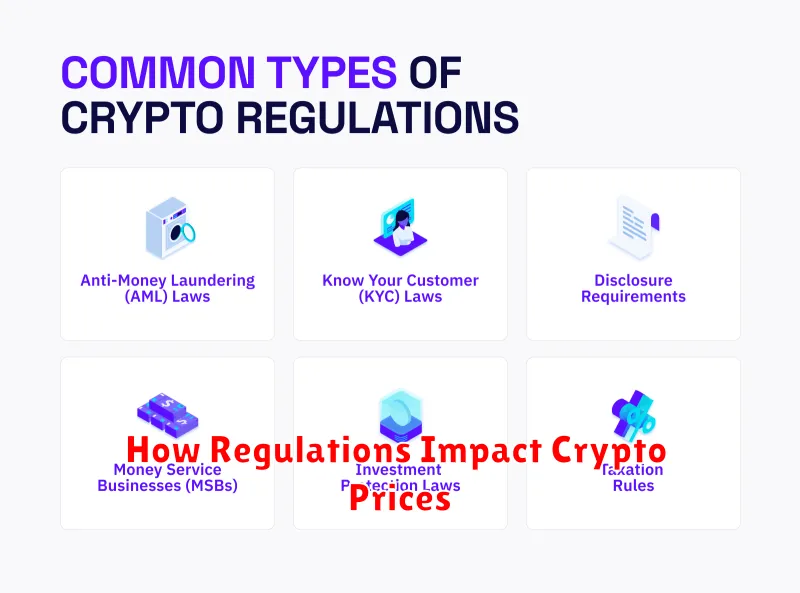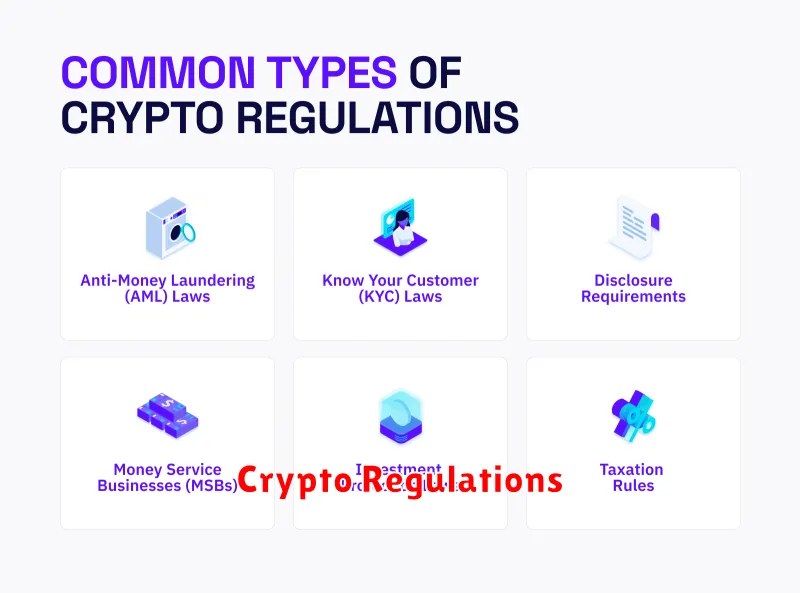Navigating the complex world of cryptocurrency requires a thorough understanding of crypto regulations. This article serves as an essential guide for all investors, regardless of experience level, outlining the key regulatory landscapes globally and their impact on your crypto investments. We will explore crucial aspects such as tax implications, KYC/AML compliance, security protocols, and the evolving legal frameworks surrounding digital assets, empowering you to make informed decisions and mitigate potential risks within this dynamic market.
Why Are Crypto Regulations Important?

Crypto regulations are crucial for several reasons. First, they protect investors from fraud and manipulation by establishing clear standards and oversight. Unregulated markets are vulnerable to scams, pump-and-dump schemes, and other deceptive practices that can lead to significant financial losses for unsuspecting individuals.
Second, regulations promote market stability and transparency. Clear rules about trading, custody, and reporting foster confidence and reduce volatility, creating a more mature and predictable environment for investors and businesses.
Third, appropriate regulations contribute to the overall security of the crypto ecosystem. They can help prevent the misuse of cryptocurrencies for illicit activities such as money laundering and terrorist financing, making the system more secure and reliable.
Finally, effective crypto regulation can encourage innovation and adoption by creating a level playing field for businesses and fostering responsible development within the industry. This leads to a more robust and sustainable crypto market in the long run.
Countries with Strict Crypto Laws

Several countries have implemented strict regulations regarding cryptocurrencies, aiming to control risks and protect investors. These regulations vary widely in their approach, ranging from outright bans to heavy restrictions on trading and usage.
China, for example, maintains a complete ban on cryptocurrency trading and mining. Similarly, Algeria and Egypt also prohibit cryptocurrency transactions. Other nations, like India, while not implementing a full ban, have imposed significant restrictions and are currently developing a comprehensive regulatory framework.
Thailand and Vietnam, despite having growing cryptocurrency adoption, enforce stringent Know Your Customer (KYC) and Anti-Money Laundering (AML) regulations. These countries require rigorous identity verification for crypto transactions, making it challenging for individuals to remain anonymous.
It’s crucial for investors to understand the specific legal landscape of each jurisdiction before engaging in cryptocurrency activities. Ignoring these regulations can lead to significant legal consequences, including hefty fines or even imprisonment.
Decentralization vs Regulation: The Debate

The cryptocurrency market’s core tenet, decentralization, clashes fundamentally with the goals of regulation. Decentralized systems, by design, operate outside the control of central authorities, offering users anonymity and autonomy. This inherent resistance to oversight is viewed by some as a key strength, ensuring security and preventing censorship. However, this lack of control also presents significant challenges.
Regulations, on the other hand, aim to protect investors, prevent illicit activities like money laundering and terrorist financing, and maintain financial stability. Regulators argue that the lack of oversight in decentralized systems creates fertile ground for fraud and market manipulation. The debate centers on finding a balance: how to harness the innovative potential of decentralized technologies while simultaneously mitigating the risks associated with their inherent lack of control. This involves navigating complex legal and technical challenges, ensuring consumer protection without stifling innovation.
The tension between these two forces is a defining characteristic of the cryptocurrency landscape. Successfully navigating this complex interplay is crucial for both the long-term growth of the cryptocurrency market and the protection of investors. The future likely involves a dynamic equilibrium, with ongoing negotiation and evolution of regulatory frameworks to address the unique characteristics of decentralized systems.
How KYC and AML Affect Crypto Users

Know Your Customer (KYC) and Anti-Money Laundering (AML) regulations are increasingly impacting cryptocurrency users. These regulations aim to prevent illicit activities like money laundering and terrorist financing within the crypto ecosystem.
For crypto users, KYC typically involves providing identification documents like passports or driver’s licenses to cryptocurrency exchanges and platforms. This allows platforms to verify user identities and comply with regulatory requirements. AML measures often involve monitoring transactions for suspicious activity, flagging potentially illicit transfers, and reporting such activity to relevant authorities.
The impact on users includes a higher level of scrutiny during account creation and ongoing transaction monitoring. While these measures aim to increase security and transparency, they can also lead to delays in transactions and added complexity for users. Failure to comply with KYC/AML requirements can result in account suspension or closure.
Compliance with KYC/AML is essential for users to access and utilize crypto services legally. The level of required verification varies across jurisdictions and platforms, but it’s crucial to understand and meet these requirements to avoid penalties and ensure continued access to the crypto market.
Taxes on Cryptocurrency Gains

Cryptocurrency transactions are subject to tax in most jurisdictions. Profits from selling, trading, or otherwise disposing of cryptocurrency are generally considered taxable events.
The specific tax implications depend on your location and the nature of the transaction. For example, in the US, cryptocurrency is treated as property for tax purposes. This means gains are taxed as capital gains, with the tax rate varying depending on your holding period and income level. Short-term gains (held for less than a year) are taxed at your ordinary income tax rate, while long-term gains (held for more than a year) are taxed at lower capital gains rates.
Tax reporting requirements also vary by location. You may need to report cryptocurrency transactions on your tax return, potentially using specialized forms or schedules. Failure to accurately report and pay taxes on cryptocurrency gains can result in significant penalties.
It’s crucial to understand the tax rules in your jurisdiction regarding cryptocurrency. Consulting a tax professional is recommended to ensure compliance and avoid potential legal issues. Proper record-keeping of all cryptocurrency transactions is also essential.
How Regulations Impact Crypto Prices

Regulations significantly influence cryptocurrency prices due to their impact on market perception, liquidity, and investor confidence. Positive regulations, such as clear guidelines and licensing frameworks, can boost investor confidence, leading to increased demand and higher prices. This is because they reduce uncertainty and perceived risk, making cryptocurrencies more appealing to institutional investors and mainstream adoption.
Conversely, negative or uncertain regulations can trigger significant price drops. Stricter rules, bans, or unclear regulatory frameworks often create fear and uncertainty, leading to sell-offs and decreased liquidity. The resulting uncertainty makes investors hesitant to participate, pushing prices down. The speed and severity of the price reaction depend on several factors, including the market’s overall sentiment and the stringency of the regulations.
Furthermore, the specific nature of the regulation matters greatly. Regulations focusing on consumer protection, for example, might have a positive impact on price by increasing trust. Regulations targeting specific activities, such as preventing money laundering, could initially cause volatility but might eventually stabilize the market in the long term. Therefore, understanding the specific details of regulatory developments is crucial for investors.
Regulatory ambiguity is particularly detrimental. The absence of clear rules can create a chilling effect on investment, leading to price volatility as investors react to speculation and rumors. Conversely, a clear and well-defined regulatory landscape can significantly reduce this uncertainty and promote stable growth.
Is Regulation Good or Bad for Crypto?

The impact of crypto regulation is complex and multifaceted, lacking a simple “good” or “bad” answer. It hinges significantly on the specifics of the regulations themselves and their implementation.
Arguments for regulation often center on increased investor protection, preventing market manipulation, and enhancing the overall stability and legitimacy of the crypto market. This could lead to broader adoption and greater trust.
Conversely, arguments against regulation highlight potential stifling of innovation, increased barriers to entry for smaller players, and the risk of overly burdensome or poorly designed rules hindering the decentralized nature of cryptocurrencies. Concerns also exist about the potential for regulatory capture.
Ultimately, the effectiveness of crypto regulation depends on striking a balance. Well-designed regulations can foster a mature and sustainable market, while poorly conceived ones can severely hamper growth and innovation. The long-term effects remain to be seen and will vary considerably based on the specific regulatory landscape implemented globally.
Future of Crypto Regulations

The future of crypto regulations remains uncertain, but several trends are emerging. Increased global coordination is likely, with nations working together to establish consistent standards and combat illicit activities. This could involve harmonizing KYC/AML (Know Your Customer/Anti-Money Laundering) regulations and tax frameworks across jurisdictions.
We can also expect to see a continued focus on consumer protection. Regulations will likely aim to protect investors from scams, fraud, and market manipulation. This might include stricter licensing requirements for exchanges and clearer disclosures for crypto products.
Stablecoin regulation will be a key area of focus, as these digital assets are increasingly integrated into the financial system. Regulators will likely seek to ensure stability and reduce systemic risk. This could mean increased reserve requirements and oversight of stablecoin issuers.
The classification of crypto assets as securities, commodities, or something else entirely will also continue to be debated and refined. This has significant implications for taxation and regulatory oversight. Clearer legal definitions are expected to emerge, potentially leading to different regulatory frameworks for different types of crypto assets.
Finally, the interplay between decentralization and regulation remains a significant challenge. Finding a balance between promoting innovation and protecting investors while respecting the decentralized nature of blockchain technology will be a critical task for policymakers in the years to come.

